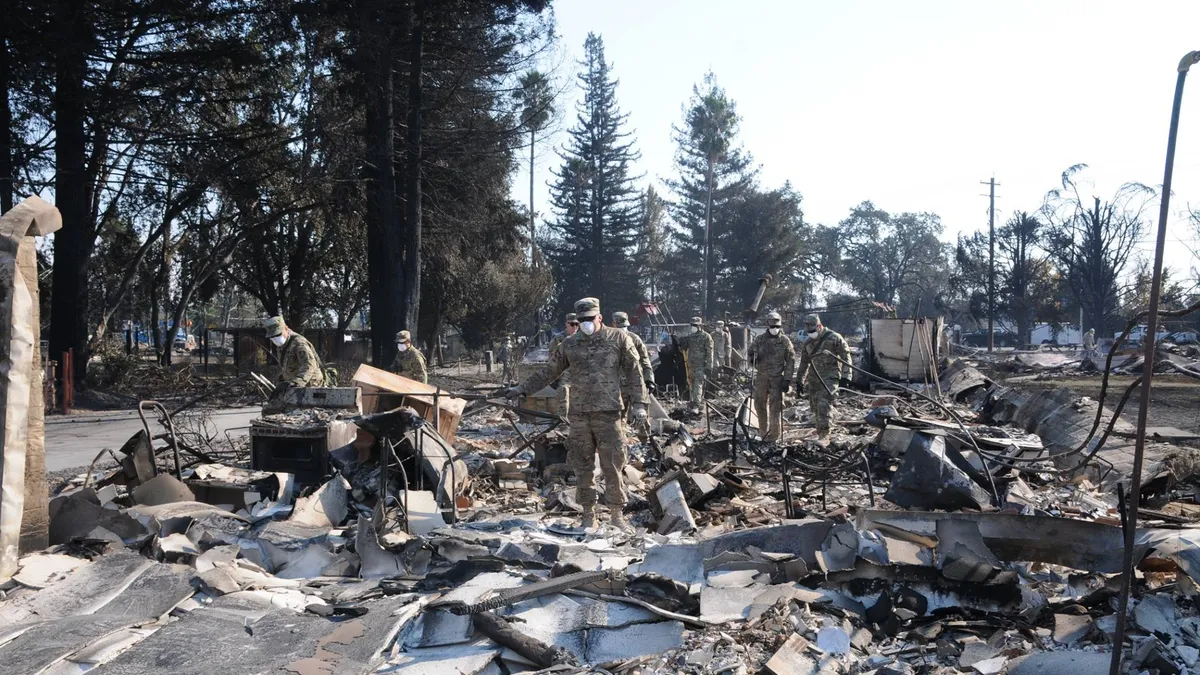Dive Brief:
- California Gov. Gavin Newsom has asked members of his administration to look into accelerating California's decarbonization goals in light of the spate of wildfires that have spread across the state, he announced Friday.
-
"While it's nice to have goals to get to 100% clean energy by 2045, that's inadequate to meet the challenges the state, and I argue this nation, faces," Newsom said during a visit to burned areas in Northern California, adding that the state has to be more aggressive in terms of meeting its goals much sooner.
- There were 28 major wildfires burning in California on Monday, according to the California Department of Forestry and Fire Protection. Wildfires have burned more than 3.2 million acres in California this year, and have claimed 24 lives and destroyed over 4,200 structures since mid-August.
Dive Insight:
In 2018, California lawmakers passed Senate Bill (SB) 100, setting the state on the path to achieve 100% renewable and zero-carbon electricity by 2045, and tasking state regulators, including the California Energy Commission, California Public Utilities Commission (PUC) and California Air Resources Board, with compiling a report — due next January — on how to implement the policy. In addition, the state is also aiming for economy-wide carbon neutrality in the same timeframe.
But "while we have audacious goals … we're going to have to do more and we're going to have to fast-track our efforts," Newsom said.
Newsom also brought up his broader concerns about climate change with President Donald Trump during the latter's visit to California Monday.
"We obviously feel very strongly that the hots are getting hotter, the dries are getting drier," Newsom said, adding that the state has experienced the hottest August in its history and a five-year drought.
The governor has asked officials at the California Environmental Protection Agency and the California Natural Resources Agency to look through the list of the state's prescriptive goals and "dust off our current processes, our current strategies, and accelerate all of them across the board." This includes broad decarbonization policies as well as measures to electrify transportation, land use efforts, and industrial and agricultural policies.
In the past, California's legislature has taken the lead on climate-related initiatives and lawmakers will likely have some appetite for accelerating progress towards SB 100, John White, executive director of the Center for Energy Efficiency and Renewable Technologies, said.
At the same time, there's a lot the administration can do without new laws, in terms of removing barriers to procurement, building new transmission and repurposing unspent funds on energy efficiency, according to White.
And there is some precedent for more accelerated decarbonization targets — for instance, in July, the Sacramento Municipal Utility District committed to delivering carbon-neutral electricity by 2030.
"The fact is, it creates an opening for Newsom to get the PUC on track to take us to these more ambitious goals," White said.
And in June, a report from the University of California, Berkeley found that the U.S. as a whole can deliver 90% of its electricity from carbon-free resources by 2035, through a combination of retiring all coal plants on that timeline, retaining existing hydropower and nuclear capacity, and shrinking natural gas generation to 10% of electricity generation.















